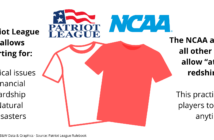Two students were barred from Lehigh’s animal research facilities after two separate incidents involving hamsters, according to a letter written to the Office of Laboratory Animal Welfare by Alan Snyder, the vice president and associate provost for research and graduate studies at Lehigh.
The Brown and White received this letter from Michael Budkie, the executive director of Stop Animal Exploitation NOW!, a group working to end experimentation on animals in laboratories. In July 2015, Snyder sent his letter to the Office of Laboratory Animal Welfare detailing the incidents involving the hamsters. Stop Animal Abuse NOW! sent Lehigh President John Simon a letter in January asking him to open an internal investigation into the incidents at Lehigh, even though they had been addressed by Snyder’s letter.
“I did report the incidents that occurred, as well as corrective actions, to the federal Office of Laboratory Animal Welfare,” Snyder wrote in an email. “There was no accusation of research misconduct, which involves acts of dishonesty or deception in conduct of research, associated with these incidents.”
Snyder wrote the first incident occurred on March 2, 2015, and involved the denial of food and water to a hamster for 36 hours. The second incident, which occurred on April 23, 2015, involved a failed attempt at euthanasia. The euthanasia of a hamster was attempted with carbon dioxide and then placed in a bag and into a freezer. It was discovered later that the hamster was outside of the bag in the freezer, indicating that it had escaped the bag and died in the freezer rather than by euthanasia, according to Snyder’s letter.
“It is extremely disturbing that Lehigh University staff both failed to properly euthanize an animal and failed to provide food/water to an animal for 36 hours,” Budkie wrote in a letter to the U.S. Department of Agriculture.
The incidents, which occurred in March and April, were not brought to the attention of the Institutional Official — Snyder — until May 8, according to Snyder’s letter. The U.S. Department of Agriculture mandates that institutions testing on animals have an Institutional Animal Care and Use Committee to ensure such things are overseen. The Institutional Animal Care and Use Committee is an organization that compiles information about conducting this type of testing. The unnamed facility director of the laboratory, who had been the chair of the Institutional Animal Care and Use Committee at Lehigh at the time, barred both students from the animal facilities in May. According to Snyder’s letter, research activity was not suspended.
“The referenced (U.S. Department of Agriculture) Inspection Report is the result of a routine inspection and was not conducted in response to a complaint,” wrote Lori Friedman, Lehigh’s director of media relations, in an email. “All research facilities that are registered with the (U.S. Department of Agriculture) are subject to routine, unannounced inspections.”
As of July 24, 2015, the facility director no longer served as chair of the Institutional Animal Care and use Committee at Lehigh.
“The facility director is no longer serving as a member of the Institutional Animal Care and Use Committee,” Friedman wrote. “This was not a punishment but part of systemic improvements to the program.”
Friedman was unable to discuss personnel matters regarding the facility director and could not name the director.
Friedman said Lehigh Communications responded to the letter on President Simon’s behalf.
Friedman also said the university followed procedures instructed by both federal law and university policy. This included the investigation by the Institutional Animal Care and Use Committee, determination of corrective actions, and the reporting of the incidents and corrective actions to the federal Office of Laboratory Animal Welfare.
The Institutional Animal Care and Use Committee’s recommended actions included the attainment and installation of a commercial euthanasia chamber and the adoption of a new standard operating procedure for carbon dioxide euthanasia, both of which were completed by Lehigh in October 2015. The Institutional Animal Care and Use Committee also called for enhanced reminders of supervisory responsibilities of principal investigators, the development and distribution of written guidance on these types of incidents and changes in the roles of personnel.
Friedman said the Office of Laboratory Animal Welfare was satisfied with Lehigh’s report and the university is in good standing with both the USDA and the Office of Laboratory Animal Welfare.
Stop Animal Abuse NOW! filed an official complaint with the U.S. Department of Agriculture against Lehigh, claiming violations of regulations relating to personnel qualifications, animal handling and inadequate animal care, according to Budkie. Stop Animal Abuse NOW! is also insisting Lehigh be charged with the maximum penalty of $10,000 per infraction per animal, which is in excess of the regulations set forth by the Office of Laboratory Animal Welfare.
“We have received the complaint and we are looking into it,” wrote Tanya Espinosa, a public affairs specialist for the U.S. Department of Agriculture, in an email. “This does not mean there is an investigation. What it means is that we are looking into the allegations listed into the complaint to see whether there were any Animal Welfare Act noncompliances that occurred.”
Stop Animal Abuse NOW! urged Lehigh to move beyond animal experimentation and to use newer technology, such as 3-D bio printing and organ-on-a-chip technology.
However, Friedman said Lehigh has no plans to discontinue the use of animal models in scientific research, but Lehigh is also committed to ensuring the proper protocol regarding animal welfare.
“Reducing or eliminating animal research would first slow, then halt, and eventually reverse medical and scientific advances,” Friedman wrote.






Comment policy
Comments posted to The Brown and White website are reviewed by a moderator before being approved. Incendiary speech or harassing language, including comments targeted at individuals, may be deemed unacceptable and not published. Spam and other soliciting will also be declined.
The Brown and White also reserves the right to not publish entirely anonymous comments.